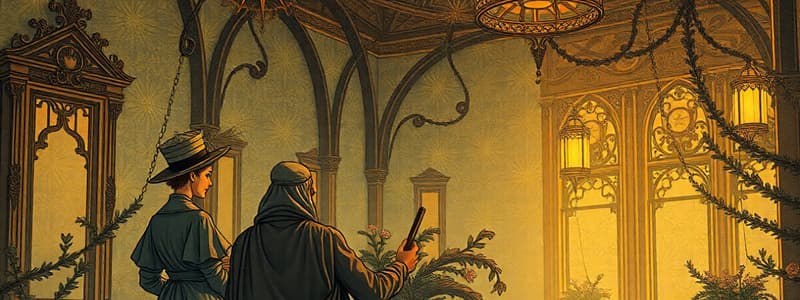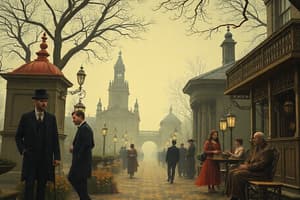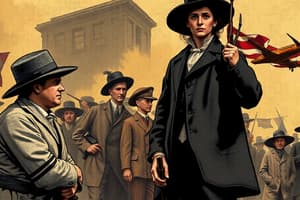Podcast
Questions and Answers
What was the primary goal of the Muckrakers during the Progressive Era?
What was the primary goal of the Muckrakers during the Progressive Era?
- To maintain the status quo of the political system.
- To expose injustices and advocate for reforms through journalism. (correct)
- To support the business practices of powerful industrialists.
- To promote labor unions and worker strikes.
How did Jacob Riis contribute to the rise of the Progressive Era?
How did Jacob Riis contribute to the rise of the Progressive Era?
- By creating artwork that depicted the lives of the wealthy.
- By funding the creation of labor unions to combat big businesses.
- By writing political articles that exposed government corruption.
- By using photojournalism to reveal the living conditions of working Americans. (correct)
Which period in United States history preceded the Progressive Era and was characterized by powerful industrialists?
Which period in United States history preceded the Progressive Era and was characterized by powerful industrialists?
- The Great Depression
- The Gilded Age (correct)
- The antebellum period
- The roaring twenties
What was the significance of Lincoln Steffens' article 'Tweed Days in St. Louis?'
What was the significance of Lincoln Steffens' article 'Tweed Days in St. Louis?'
What impact did Muckrakers have on American society during the Progressive Era?
What impact did Muckrakers have on American society during the Progressive Era?
President Theodore Roosevelt coined the term 'Muckraker' to describe what?
President Theodore Roosevelt coined the term 'Muckraker' to describe what?
How did the Muckrakers contribute to the growth and power of big business during the Gilded Age and Progressive Era?
How did the Muckrakers contribute to the growth and power of big business during the Gilded Age and Progressive Era?
What was a common subject of focus among the Muckrakers?
What was a common subject of focus among the Muckrakers?
What was the main outcome of Ida Tarbell's exposé on Standard Oil?
What was the main outcome of Ida Tarbell's exposé on Standard Oil?
Upton Sinclair's The Jungle primarily aimed to:
Upton Sinclair's The Jungle primarily aimed to:
What was the unintended primary consequence of Upton Sinclair's The Jungle?
What was the unintended primary consequence of Upton Sinclair's The Jungle?
How did John Spargo contribute to the muckraking movement?
How did John Spargo contribute to the muckraking movement?
How did Ray Stannard Baker distinguish himself from other muckrakers of his time?
How did Ray Stannard Baker distinguish himself from other muckrakers of his time?
What did William Hard's 1907 Making Steel and Killing Men focus on?
What did William Hard's 1907 Making Steel and Killing Men focus on?
Which of the following best describes the common goal among muckrakers like Tarbell, Sinclair, and Spargo?
Which of the following best describes the common goal among muckrakers like Tarbell, Sinclair, and Spargo?
What was a key difference between John Spargo's work and that of many other muckrakers?
What was a key difference between John Spargo's work and that of many other muckrakers?
Which muckraker worked under the pen name David Grayson?
Which muckraker worked under the pen name David Grayson?
What was a consequence of Tarbell's work on Standard Oil even after the company was broken up?
What was a consequence of Tarbell's work on Standard Oil even after the company was broken up?
Flashcards
Muckrakers
Muckrakers
Journalists who exposed injustices and corruption in business and politics during the Progressive Era.
Progressive Era
Progressive Era
A period of social and political reform in the United States from the 1890s to the 1920s.
Gilded Age
Gilded Age
The era of rapid economic growth and wealth disparity dominated by powerful business figures.
Jacob Riis
Jacob Riis
Signup and view all the flashcards
How the Other Half Lives
How the Other Half Lives
Signup and view all the flashcards
Lincoln Steffens
Lincoln Steffens
Signup and view all the flashcards
The Shame of the Cities
The Shame of the Cities
Signup and view all the flashcards
Ida Tarbell
Ida Tarbell
Signup and view all the flashcards
Sherman Antitrust Act (1911)
Sherman Antitrust Act (1911)
Signup and view all the flashcards
Upton Sinclair
Upton Sinclair
Signup and view all the flashcards
The Jungle
The Jungle
Signup and view all the flashcards
Meat Inspection Act & Pure Food and Drug Act (1906)
Meat Inspection Act & Pure Food and Drug Act (1906)
Signup and view all the flashcards
Food and Drug Administration (FDA)
Food and Drug Administration (FDA)
Signup and view all the flashcards
John Spargo
John Spargo
Signup and view all the flashcards
William Hard
William Hard
Signup and view all the flashcards
Ray Stannard Baker
Ray Stannard Baker
Signup and view all the flashcards
Following the Color Line
Following the Color Line
Signup and view all the flashcards
Study Notes
- The late 1800s was known as the Gilded Age, where business titans like Andrew Carnegie and John D. Rockefeller dominated the United States.
- Labor unions struggled to reform working conditions due to the immense power of big business.
- Jacob Riis's photojournalism in How the Other Half Lives (1890) visually exposed the harsh living and working conditions in New York City.
- By 1890, the United States was ready for reform that would result in major reforms in various aspects of life known as the Progressive Era.
- Muckrakers were journalists who exposed injustices in workplaces and business practices, advocating for reform.
- President Teddy Roosevelt coined the term "Muckraker" in 1906 to describe these journalists.
- Muckrakers brought awareness to the plight of industrial workers and poor quality of goods, resulting in major reforms.
Lincoln Steffens
- Lincoln Steffens was a muckraker who worked as a journalist in New York City, and eventually became the managing editor of McClure's magazine.
- In 1902, Steffens exposed political corruption in St. Louis in his article "Tweed Days in St. Louis".
- The Shame of the Cities (1904) exposed corruption in cities like New York, Chicago, and Minneapolis.
- Steffens's writings led to reforms in local governments.
Ida Tarbell
- Ida Tarbell wrote about the business practices of Rockefeller's Standard Oil.
- Her series of 19 articles were published as The History of Standard Oil in 1904, revealing Standard Oil's monopolization.
- The U.S. Supreme Court broke up Standard Oil into 34 smaller companies in 1911 due to Tarbell's work and the Sherman Antitrust Act.
Upton Sinclair
- Upton Sinclair exposed dangerous working conditions in the meatpacking industry.
- His 1906 novel, The Jungle, was set in a meatpacking plant in Chicago.
- The Jungle revealed the unsafe working conditions of the meatpacking industry for workers.
- Readers were more concerned about the quality of meat than working conditions.
- President Roosevelt ordered a federal investigation that confirmed Sinclair's account.
- The Meat Inspection Act and the Pure Food and Drug Act were passed in 1906, establishing food regulations.
- The Food and Drug Administration (FDA) was established to regulate products consumed in the United States.
John Spargo and William Hard
- John Spargo examined child labor in the United States.
- His 1906 book, The Bitter Cry of the Children, exposed child labor in the coal industry.
- William Hard focused on dangerous working conditions in the steel industry in Making Steel and Killing Men (1907).
- Spargo and Hard's publications fueled the Progressives' calls for greater reform and improved working conditions for industrial workers
Ray Stannard Baker
- Ray Stannard Baker wrote under the pen name David Grayson, and exposed corruption in the railroad industry and financial institutions.
- In 1908, Baker published Following the Color Line, which covered the struggles of African Americans.
- Baker was one of the first American journalists to address racial issues, including lynchings, poverty, and Jim Crow laws.
Studying That Suits You
Use AI to generate personalized quizzes and flashcards to suit your learning preferences.
Description
Explore the Progressive Era, marked by reform efforts following the Gilded Age. Muckrakers like Lincoln Steffens exposed injustices, raising awareness about industrial workers' conditions and product quality. These efforts led to significant reforms in various aspects of American life.




